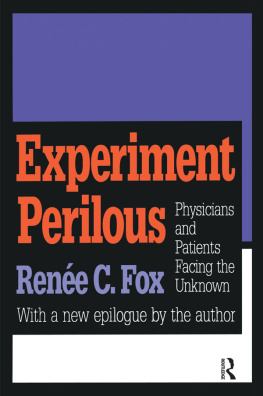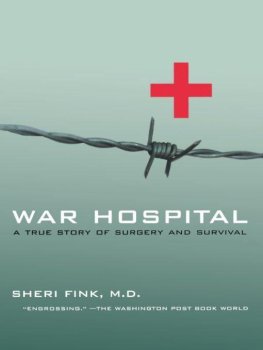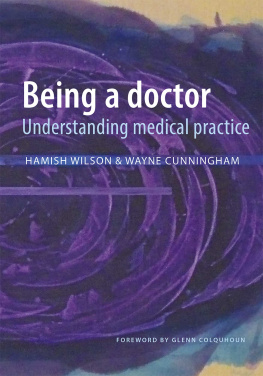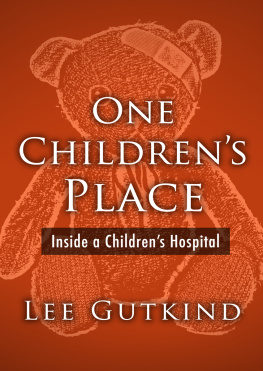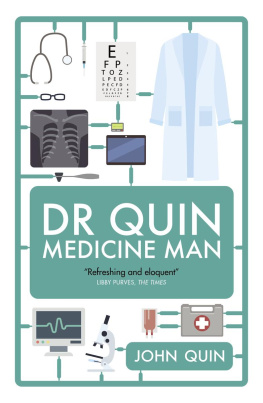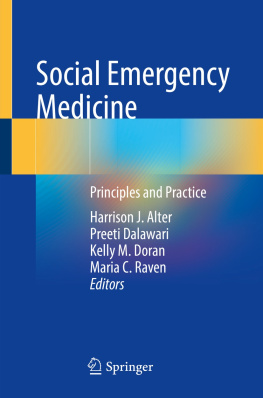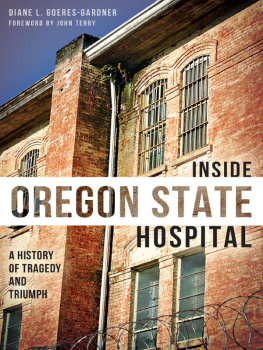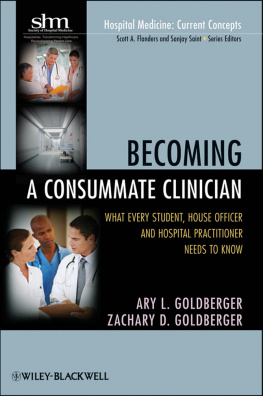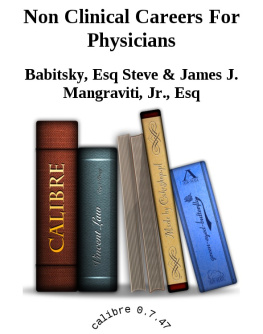Experiment Perilous
Originally published in 1959 by The Free Press
First paperback edition published in 1974 by University of Pennsylvania
Published 1998 by Transaction Publishers
Published 2019 by Routledge
2 Park Square, Milton Park, Abingdon, Oxon OX14 4RN
52 Vanderbilt Avenue, New York, NY 10017
Routledge is an imprint of the Taylor & Francis Group, an informa business
New material this edition copyright 1998 by Taylor & Francis
All rights reserved. No part of this book may be reprinted or reproduced or utilised in any form or by any electronic, mechanical, or other means, now known or hereafter invented, including photocopying and recording, or in any information storage or retrieval system, without permission in writing from the publishers.
Notice:
Product or corporate names may be trademarks or registered trademarks, and are used only for identification and explanation without intent to infringe.
Library of Congress Catalog Number: 97-9857
Library of Congress Cataloging-in-Publication Data
Fox, Rene C. (Renee Claire), 1928-
Experiment perilous : physicians and patients facing the unknown /
Rene C. Fox : with a new epilogue by the author.
p. cm.
Previously published: Glencoe, III. : Free Press, 1959.
Includes bibliographical references and index.
ISBN 1-56000-949-7 (pbk. : alk. paper)
1. Human experimentation in medicineMoral and ethical aspects.
2. Clinical medicineResearchMoral and ethical aspects. 3. Human
experimentation in medicineSocial aspects. 4. Clinical medicine
ResearchSocial aspects. 5. Physician and patient. 6. Peter Bent
Brigham HospitalResearchHistory. I. Title
R853.H8F68 1997
619dc21
97-9857
CIP
ISBN 13: 978-1-56000-949-8 (pbk)
ISBN 13: 978-1-138-52325-8 (hbk)
For the physicians of the Metabolic Group
and the patients of Ward F-Second
and for Joe
Acknowledgments
T HE FOLLOWING persons made it possible for me to undertake and realize the writing of this book: P. Fred and Henrietta Fox, my parents; Talcott Parsons, Bernard and Elinor G. Barber, Dr. Paul D. McGehee, Joseph A. Precker, Dr. Roy C. Swan, Toinette Balkema, Dahla Larson, Jennie Pecevich, Bridget Gellert, Elisabeth G. Humez, the physicians of the Metabolic Group, and the patients of Ward F-Second. My debt to these friends, teachers, and participants in the Experiment Perilous is beyond words.
Rene C. Fox
New York, N. Y.
I N THE EARLY 1950s, when I undertook the research on which Experiment Perilous is based, the sociology of medicine, though in its infancy, had begun to flourish. I was one of a number of social scientists, for example, who were engaged in what were then pioneering, participant-observation-based studies of hospitals or hospital wards as social systems. Out of these inquiries eventually came William Caudills The Psychiatric Hospital as a Small Society, Rose Laub Cosers Life in the Ward, Erving Goftmans Asylums, Julius Roths Timetables, and The Mental Hospital by Alfred H. Stanton and Morris S. Schwartz, among others.
However, my own field experiences differed from those of my colleagues in at least one significant respect. I had become involved in studying a hospital community, known as F-Second, that was a metabolic research ward. The men who were hospitalized here were ill with diseases that had not yielded to the diagnostic and therapeutic capacities of modern medicine. Partly as a consequence, they were patients who were willing, and in many instances zealous, research subjects for the physicians of the Metabolic Group, a team of clinical investigators with the dual and often conflicting responsibility of caring for the patients of F-Second and conducting research upon them in order to advance medical knowledge and technique.
Ward F-Second plunged me into a world of extreme stress that turned around inexorable illness, human experimentation, uncertainty, suffering, and death. In this, shared predicament, along with the patients and physicians, I had to find ways of coming to terms with the existential implications of that perilous experiment, the anguished emotions it aroused and the ethical dilemmas it posed. My professional obligation was to navigate sufficiently well in that situation to make good, objective, but feeling sociology out of it. The ways that I developed for coping with the tragi-comedy of the ward were explicitly and implicitly taught to me by the patients and physicians of F-Second. The shared stresses and the common modes of dealing with them that these two groups of men had evolved gradually became the focus of my study.
The major intellectual challenge with which Ward F-Second confronted me was that, to my knowledge, no first-hand sociological study of terminal illness, medical experimentation with human subjects, or the psychosocial dynamics of therapeutic innovation had ever been made. Not only was there no precedent for such an inquiry, but its legitimacy was questionable. Neither the moral justification for this type of study nor its social scientific meaningfulness was established. If anything, the academic medical and social scientific climate of the 1950s ran counter to it. A strong commitment to being scientific prevailed, with a heavy emphasis on achieving the highest possible standards of rationality, objectivity, and rigor. Even in medical settings conducive to it, for example, serious, outright discussions about death, dying, or terminal illness were generally considered too philosophical and too emotional to conform to this image of science. Among social scientists, these topics were not proscribed; they simply fell outside the orbit of what was then defined as an appropriate and fruitful topic to pursue. Both medical and social scientific milieus had been sufficiently influenced by psychoanalytic thinking to be wary about the implications of getting over-involved in the human situations with which they dealt as professionals, or of becoming overly identified with them. This was regarded as not only unscientific and unprofessional, but also as a symptom of deeper personality problems that ought to be worked through. The predominant ideology of rationality and detachment inhibited the development of a sociology of suffering or of death. And it contributed to widespread skepticism about the findings of participant-observation field studies on the grounds that however real they might seem to be, and however sensitively and compassionately they might be rendered, they were inherently subjective. Finally, the early 1950s was a time of great enthusiasm about clinical medical research. World War II seemed to have brought in its wake a new, very promising era of biomedical advance. Expectation about imminent breakthroughs in medical knowledge and healing capacities ran high. Especially in the United States, clinical investigation enjoyed prestige as well as approval, and was being handsomely supported by private foundations and the young National Institutes of Health. Memories of the Nazi medical war crimes were still hauntingly present. But the renaissance of medical research was incompatible with sustained brooding about the ethicality of human experimentation under various conditions, or about the social and cultural questions that it raised.
Twenty years later, the orientation and ambience both in medicine and social science are markedly different. Although the canon of scientific objectivity still guides medical and social research, criticism of the dehumanization that an overly detached approach can effect is more frequently heard. There is also less of a tendency to view involvement exclusively as a methodological aberration. Concerned interest in ethical and existential issues related to biomedical advance, the delivery of medical care, and medical decision-making in general is now more salient in medicine and social science. Such issues have become proper, even fashionable, subjects of study in these fields, and in the fields of philosophy, theology, and law, as well. Two substantive areas on which this interest has come to focus are death and dying, and medical research with human subjects. The attention now being devoted to these subjects is one of numerous signs that a serious re-examination of certain values and beliefs on which modern medicine is premised may be taking place. These developments in medicine are part of a broader and deeper process of cultural reflection, reorientation, and change currently taking place in American society.

